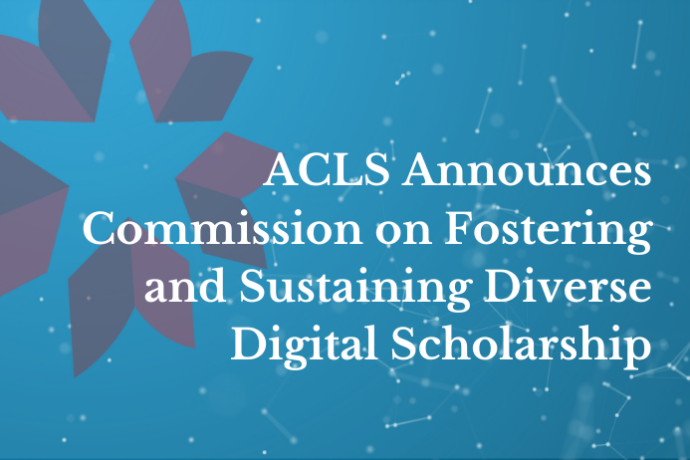ACLS Launches Commission on Fostering and Sustaining Diverse Digital Scholarship

The American Council of Learned Societies is pleased to announce the formation of the Commission on Fostering and Sustaining Diverse Digital Scholarship, with support from The Andrew W. Mellon Foundation. The project builds on a grant from the National Endowment for the Humanities for research on the sustainability of digital humanities projects.
The Commission will study questions of equitable access in the creation of and access to digital resources and projects related to social and racial justice. This assembly of leading scholars, librarians, archivists, publishers, and university leaders will also address challenges associated with the infrastructure and organizational models for the development of and public access to this work. The Commission’s investigations should provide insights that advance approaches to access and sustainability for digital humanities resources more generally. Through a series of roundtables, working papers, and community feedback engagements, the Commission will produce a report with sector-wide recommendations for strengthening the opportunity structure for digital humanities projects that support new directions in scholarship and improve public access to knowledge.
Professor Marisa Parham has been named Chair of the Commission. She serves as director of the African American Digital Humanities Initiative (housed in the University of Maryland, College Park), is the associate director for the Maryland Institute for Technology in the Humanities, and co-directs the Immersive Realities Lab for the Humanities, an independent workgroup for digital and experimental humanities.
Upon reflecting on the necessity of the work of this Commission, Parham noted, “Here is where we are: from across a wide range of institutions, local sites, activist organizations and more, communities have repeatedly demonstrated their commitment to using digital methods to excavate, curate, and share various kinds of digital heritage. Whether the presentation of that heritage be an interactive timeline, a database, a new media project, or otherwise, it is the work of this commission to ask scholars, librarians, and communities a series of difficult questions: how and where does this work flourish? Who or what falls out of our various equations? How will we make our projects last? How do we continue to cultivate or preserve our objects? And what is especially at stake in this for work seeded in historically marginalized or emergent communities?”
Parham is joined by Commissioners who reflect the diverse and dynamic ecosystem of digital humanities:
- Edward Ayers – University Professor of the Humanities and Executive Director of New American History, University of Richmond
- Lisa Brooks – Professor of English, Amherst College
- Kim Christen – Professor and Director, Digital Technology and Culture Program & Director, Center for Digital Scholarship and Curation, Washington State University
- Dan Cohen – Dean of the Library, Northeastern University
- Maria Eugenia Cotera – Associate Professor of Mexican American and Latino Studies, The University of Texas at Austin
- Meredith Evans – 74th President of the Society of American Archivists
- Maryemma Graham – Founding Director of Project on the History of Black Writing and BBIP Lead & Distinguished Professor of English, University of Kansas
- Joshua Greenberg – Program Director, Alfred P. Sloan Foundation
- Charles J. (Chuck) Henry – President, Council on Library and Information Resources (CLIR)
- May Hong HaDuong – Director of the UCLA Film & Television Archive, University of California – Los Angeles
- Bergis Jules – Archivist, Shift Collective & Project Director, Documenting the Now
- Kenton Rambsy – Assistant Professor of African American Literature and Digital Humanities, The University of Texas at Arlington
- K.J. Rawson – Associate Professor of English and Women’s, Gender and Sexuality Studies & Coordinator of Digital Integration Teaching Initiative, Northeastern University
- Roopika Risam – Chair of Secondary and Higher Education & Associate Professor of Education and English, Salem State University
- Claire Stewart – Dean of University Libraries, University of Nebraska-Lincoln
- Gabriela Baeza Ventura – Associate Professor of Hispanic Literature and Spanish, University of Houston
- Ben Vinson III – Provost and Executive Vice President, Case Western Reserve University
- Charles Watkinson – Associate University Librarian for Publishing, University of Michigan Library & Director, University of Michigan Press
- Stacie Williams – Division Chief of Archives and Special Collections, Chicago Public Library
- Jewon Woo – Associate Professor of English, Lorain County Community College
The Commission will be supported by a team of experienced librarians and scholars, including Carol Mandel (Distinguished CLIR fellow and Dean Emerita of Libraries, New York University), Katrina Fenlon (Assistant Professor at College of Information Studies at University of Maryland, College Park) and, Zoe LeBlanc, Assistant Professor, School of Information Sciences at the University of Illinois, Urbana-Champaign.
“For more than one hundred years, ACLS has supported the varied strata of scholars engaged in humanistic scholarship; convening a Commission to ask incisive questions about access to, and support of, diverse digital scholarship is central to the academy’s effort to support essential fields of study,” said James Shulman, Vice President of ACLS, on the Council’s commitment to this effort. “Encouraging scholars and scholarship that responds to the needs and interests of diverse audiences requires developing a solid understanding of the social and technical structural challenges that we face. We are delighted to support the work of this stellar Commission.”
ACLS also recently launched the Digital Justice Grant Program, made possible with support from the Mellon Foundation, which will offer both Seed and Development Grants to promote and provide vital resources for projects that diversify the digital domain, advance justice and equity in digital scholarly practice, and contribute to public understanding of racial and social justice issues.

